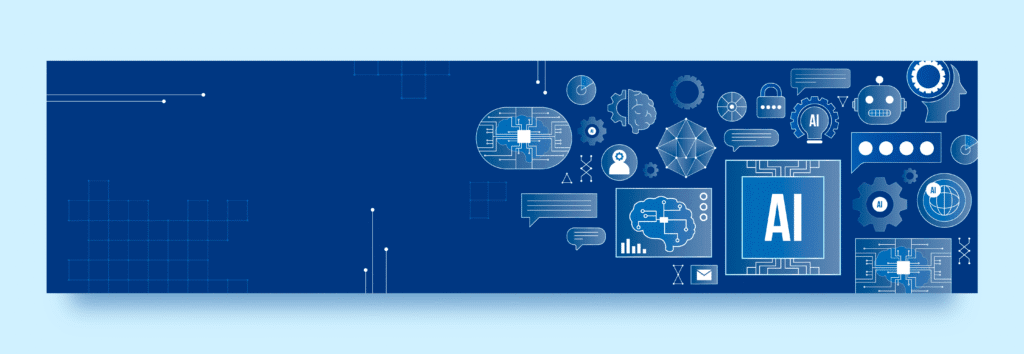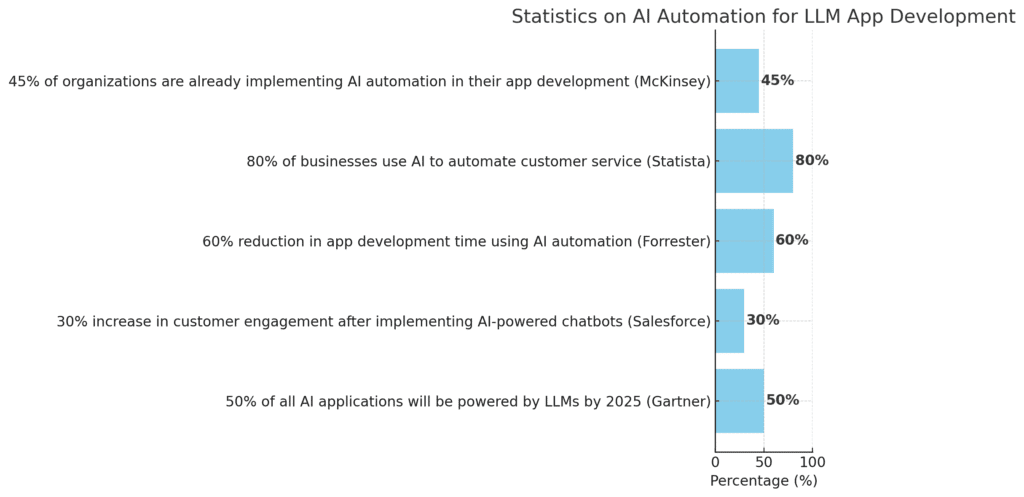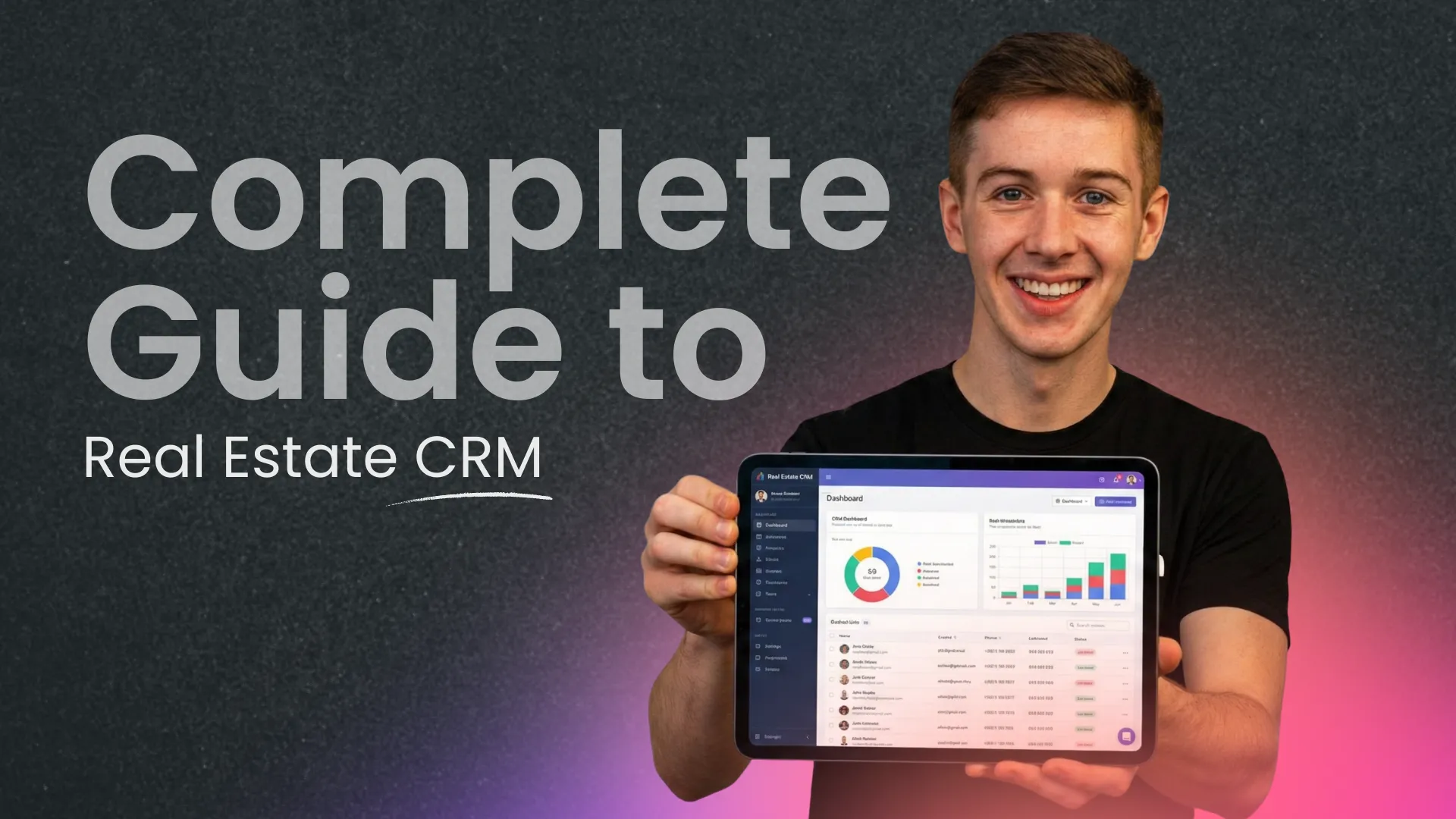Introduction: The Future of Application Development with AI Automation
In the ever-evolving world of technology, AI and machine learning (ML) are taking the center stage, transforming industries and reshaping traditional methods of app development. One of the most exciting advancements in this space is the rise of AI automation for building LLM apps (Large Language Model applications). With the help of cutting-edge AI tools, it’s now easier than ever to create sophisticated applications that can understand and process human language, making them smarter and more efficient.
LLM apps, powered by large-scale machine learning models like OpenAI’s GPT or Google’s BERT, can now be integrated into various platforms to perform complex tasks like content generation, customer support, data analysis, and more. The integration of AI automation into the app-building process has revolutionized how businesses approach software development. Instead of relying solely on manual coding, businesses can now leverage automated AI platforms to create custom, high-performing applications at scale.
Launch Your App Today
Ready to launch? Skip the tech stress. Describe, Build, Launch in three simple steps.
BuildIn this blog, we will explore what LLM apps are, how AI automation simplifies the development process, the benefits of building LLM apps using AI tools, and how you can harness AI automation to build powerful LLM applications for your business.
What Are LLM Apps and How Do They Work?

Large Language Models (LLMs) are AI models trained on vast amounts of text data. These models can process, understand, and generate human-like text based on the input they receive. The key capability of LLMs lies in their ability to handle complex natural language processing (NLP) tasks, making them a powerful tool for developers who want to create smarter applications.
Key Features of LLM Apps:
- Text Generation: LLM apps can generate human-like text for content creation, chatbots, and more.
- Text Summarization: These apps can read lengthy documents and provide concise summaries.
- Sentiment Analysis: LLM models can detect emotions or sentiments in text, useful for customer feedback analysis.
- Language Translation: LLM apps can be used for real-time translation, breaking down language barriers.
- Contextual Understanding: LLMs are capable of understanding context in conversations, making them ideal for virtual assistants and AI chatbots.
How AI Automation Integrates into LLM App Development
AI automation simplifies and accelerates the development of LLM apps by streamlining various processes:
- Data Preparation: AI platforms automate the process of cleaning and structuring data required for training LLM models.
- Model Selection: AI tools can recommend the best LLM for your specific needs, taking into account factors such as the type of data and the complexity of tasks.
- Training and Fine-Tuning: Automated platforms can train LLMs on your data, and fine-tune the models based on feedback, ensuring optimal performance.
- Deployment: Once the model is ready, AI platforms enable automatic deployment to cloud environments, ensuring the app scales seamlessly with user demand.
Why AI Automation Is Essential for Building LLM Apps
1. Speed and Efficiency
Building LLM apps manually is a time-consuming and resource-intensive process. By leveraging AI automation, businesses can bypass the traditional development roadblocks and go from concept to deployment in a fraction of the time. Whether you’re creating a virtual assistant, an automated content generator, or a sentiment analysis tool, AI automation drastically reduces development time.
2. Cost Reduction
The complexity of LLM app development requires specialized expertise in machine learning and natural language processing. By using AI-driven platforms, businesses can significantly cut costs by eliminating the need for hiring specialized developers or data scientists. Automation takes care of many aspects of the app development process, reducing both time and financial investment.
3. Ease of Use
AI app builders designed for LLM apps are increasingly user-friendly, with no-code or low-code features that allow even non-technical users to develop apps. These platforms offer intuitive interfaces, drag-and-drop features, and easy-to-use templates, making it simple for businesses to build custom LLM applications without a deep understanding of AI.
4. Scalability
One of the biggest challenges in app development is scaling applications to handle growth. AI automation platforms automatically scale the infrastructure required for LLM apps, ensuring they remain responsive even as traffic increases. Whether you’re launching a customer service chatbot or an advanced language translation tool, scaling becomes effortless with AI-driven deployment and infrastructure management.
5. Improved Accuracy and Performance
AI automation can help enhance the accuracy of LLM apps by continuously analyzing performance and making adjustments based on real-world data. With automated testing and fine-tuning, your LLM app will perform optimally and adapt to changes in user behavior, leading to better outcomes and more satisfied users.
How to Build LLM Apps Using AI Automation: A Step-by-Step Guide
Step 1: Define Your LLM App’s Purpose and Features
Before jumping into the development process, clearly define what you want your LLM app to accomplish. Whether it’s an intelligent customer service chatbot or a content creation tool, having a clear vision will guide your decisions throughout the development process. Identify the following:
- Target Audience: Who will use your app?
- Core Features: What tasks will the app perform?
- Desired Outcomes: What problem will the app solve for users?
Step 2: Choose the Right AI Automation Platform
Several AI automation platforms specialize in LLM app development. Some popular options include:
- OpenAI’s GPT: Ideal for natural language understanding, text generation, and chatbot creation.
- Google’s BERT: Excellent for tasks involving contextual language understanding and search engine optimization (SEO).
- Hugging Face Transformers: Offers a variety of pre-trained models for NLP tasks like sentiment analysis and text summarization.
When choosing a platform, consider factors such as ease of use, customization options, and the type of LLM best suited for your app’s needs.
Step 3: Automate Data Preparation and Model Training
AI automation tools can automatically process your data, structure it, and prepare it for model training. You can upload your data (text, conversation logs, or articles), and the platform will clean, organize, and label it for training. AI automation can also recommend the optimal parameters for training the LLM and fine-tune the model based on feedback.
Step 4: Integrate the Model into Your App
Once your model is trained, you can integrate it into your app using an API. Many AI platforms offer ready-to-use APIs that enable seamless integration of LLMs into your app, allowing it to interact with users, process requests, and generate results in real time.
Step 5: Deploy and Monitor Your App
Deploying an LLM app requires cloud infrastructure. AI automation tools handle the deployment process by automatically provisioning the necessary resources on cloud platforms like AWS, Google Cloud, or Microsoft Azure. Once the app is live, you can monitor its performance using built-in analytics and adjust the model as needed.
Benefits of Using AI Automation for Building LLM Apps

1. Faster Time-to-Market
Using AI automation, businesses can build and launch LLM apps much faster than through traditional methods, allowing them to respond to market demands quickly and stay ahead of competitors.
2. Improved Customer Experience
LLM apps powered by AI can provide a personalized and seamless experience for users. Whether it’s through chatbots or content recommendations, LLM apps make interactions more engaging and efficient, leading to higher customer satisfaction.
3. Enhanced Innovation
AI automation helps businesses think outside the box by providing easy access to powerful LLMs. This fosters innovation, as companies can experiment with new AI-powered features and applications without needing to hire a team of specialists.
4. Increased ROI
By reducing the development time and costs, AI automation helps businesses achieve a higher return on investment. LLM apps also help optimize business processes, improve customer service, and generate valuable insights, all contributing to increased profitability.
Case Study: How AI Automation Transformed a Business
Case Study: A Customer Service Revolution for E-Commerce
Consider the example of ShopSmart, an e-commerce company that wanted to improve its customer service operations. Traditionally, customer service teams manually handled inquiries, which led to slow response times and frustrated customers. By leveraging AI automation, ShopSmart implemented an LLM-powered chatbot that could handle customer queries in real time, provide personalized product recommendations, and assist with order tracking.
The result? ShopSmart’s customer satisfaction levels skyrocketed, with a 40% reduction in customer service response times and a 30% increase in overall sales due to improved customer engagement.
Conclusion: Building Smarter Apps with AI Automation
AI automation is revolutionizing how businesses create and deploy LLM apps. From reducing development costs and time to enhancing app performance and scalability, the advantages are clear. By automating tasks like data processing, model training, and app deployment, businesses can create sophisticated, intelligent applications without the need for specialized coding skills.
If you’re ready to embrace the future of application development, AI automation offers the perfect solution for building powerful LLM apps. Whether you’re an entrepreneur looking to create a smarter customer service app or a large enterprise seeking to harness the power of AI for content generation, automation can help you bring your ideas to life faster, smarter, and more cost-effectively.
Don’t miss out on the future of app development. Start building your LLM app with AI automation today and stay ahead of the competition!
FAQs Related to Building LLM Apps with AI Automation
1. What are Large Language Models (LLMs)?
LLMs are machine learning models trained on vast amounts of textual data that can generate and understand human-like text. They are primarily used for tasks such as language translation, text generation, and sentiment analysis.
2. How does AI automation help in LLM app development?
AI automation speeds up the process of training, testing, and deploying LLMs by handling data preparation, model selection, and scaling, which significantly reduces development time and cost.
3. Do I need coding skills to build LLM apps with AI automation?
No, most AI automation platforms are designed with no-code or low-code interfaces that allow non-technical users to build LLM apps easily.
4. What types of apps can be built using LLMs?
LLMs can be used to build apps such as virtual assistants, chatbots, content generation tools, sentiment analysis systems, and more.
5. Are LLM apps scalable?
Yes, AI automation platforms ensure that your LLM app can scale effortlessly, handling increased traffic and providing high performance even as demand grows.
6. How secure are LLM apps built with AI automation?
Most AI automation platforms incorporate robust security features, including data encryption and compliance with privacy regulations like GDPR, to ensure that your app and its data remain secure.
7. What industries can benefit from LLM apps?
Industries such as e-commerce, customer service, healthcare, finance, and content creation can greatly benefit from LLM apps powered by AI automation.
8. How much does it cost to build an LLM app with AI automation?
Costs vary depending on the platform you use and the complexity of the app. However, AI automation significantly reduces development costs compared to traditional methods.
9. Can I integrate third-party services into my LLM app?
Yes, most AI platforms allow for easy integration with third-party services like payment gateways, CRM systems, and social media platforms.
10. How long does it take to build an LLM app using AI automation?
Depending on the complexity of your app, it can take anywhere from a few days to a few weeks to develop an LLM app using AI automation, significantly faster than traditional methods.
Launch Your App Today
Ready to launch? Skip the tech stress. Describe, Build, Launch in three simple steps.
Build





